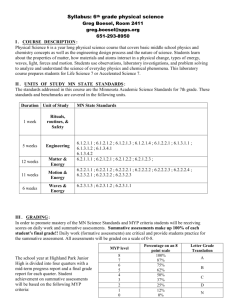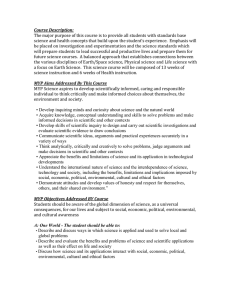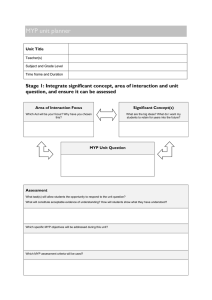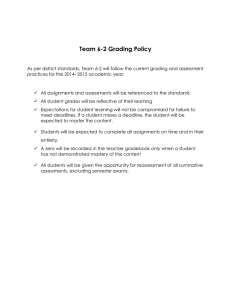MVHS IB MYP and DP Assessment Policy I. Statement of Philosophy:
advertisement
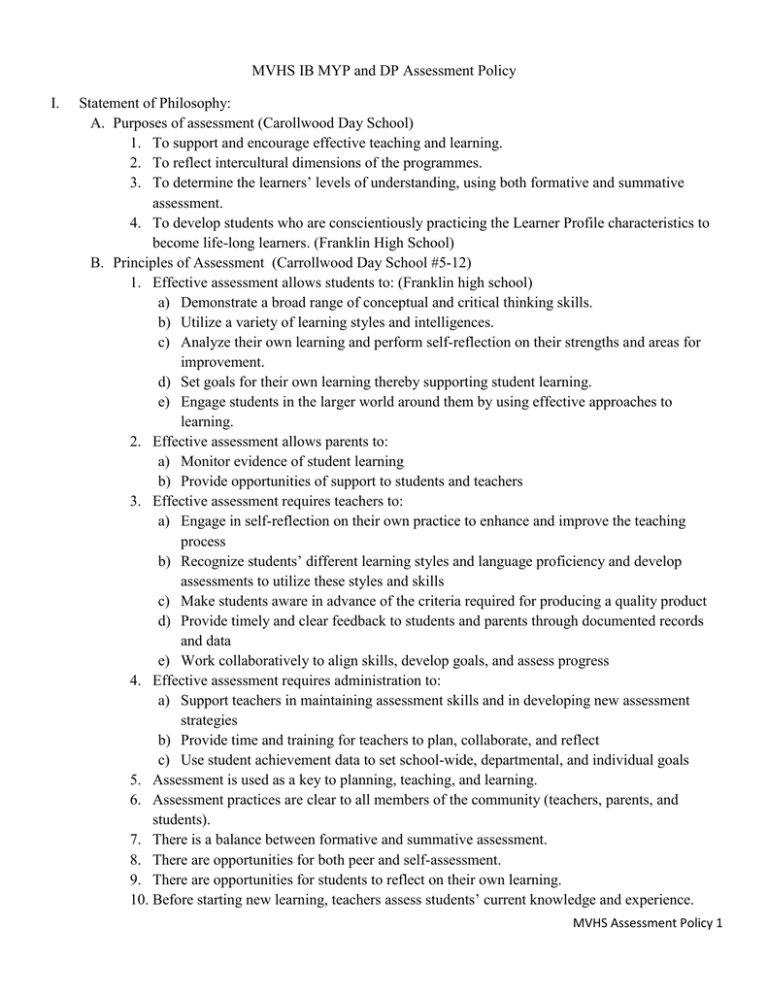
MVHS IB MYP and DP Assessment Policy I. Statement of Philosophy: A. Purposes of assessment (Carollwood Day School) 1. To support and encourage effective teaching and learning. 2. To reflect intercultural dimensions of the programmes. 3. To determine the learners’ levels of understanding, using both formative and summative assessment. 4. To develop students who are conscientiously practicing the Learner Profile characteristics to become life-long learners. (Franklin High School) B. Principles of Assessment (Carrollwood Day School #5-12) 1. Effective assessment allows students to: (Franklin high school) a) Demonstrate a broad range of conceptual and critical thinking skills. b) Utilize a variety of learning styles and intelligences. c) Analyze their own learning and perform self-reflection on their strengths and areas for improvement. d) Set goals for their own learning thereby supporting student learning. e) Engage students in the larger world around them by using effective approaches to learning. 2. Effective assessment allows parents to: a) Monitor evidence of student learning b) Provide opportunities of support to students and teachers 3. Effective assessment requires teachers to: a) Engage in self-reflection on their own practice to enhance and improve the teaching process b) Recognize students’ different learning styles and language proficiency and develop assessments to utilize these styles and skills c) Make students aware in advance of the criteria required for producing a quality product d) Provide timely and clear feedback to students and parents through documented records and data e) Work collaboratively to align skills, develop goals, and assess progress 4. Effective assessment requires administration to: a) Support teachers in maintaining assessment skills and in developing new assessment strategies b) Provide time and training for teachers to plan, collaborate, and reflect c) Use student achievement data to set school-wide, departmental, and individual goals 5. Assessment is used as a key to planning, teaching, and learning. 6. Assessment practices are clear to all members of the community (teachers, parents, and students). 7. There is a balance between formative and summative assessment. 8. There are opportunities for both peer and self-assessment. 9. There are opportunities for students to reflect on their own learning. 10. Before starting new learning, teachers assess students’ current knowledge and experience. MVHS Assessment Policy 1 11. Teachers provide students with feedback for future learning. 12. Reporting to parents is meaningful. C. Compliance with principles and practices expected by the IBO 1. Key features of the IB Diploma Programme assessment are upheld: (IBO) a) An emphasis on criterion-related (as opposed to norm-referenced) assessment, which means student work is judged in relation to identified levels of attainment. b) A distinction between formal IB assessment and the supporting formative processes within the school. c) Valuing the most accurate demonstration of student performance, rather than just averaging attainment grades over a reporting period. d) Examining student understanding at the end of the course, based on the whole course and not just aspects of it. e) Students must be able to recall, adapt and apply knowledge and skills to new questions and contexts. f) Most importantly, to support curricular goals and encourage appropriate student learning. D. Other assessment requirements of other authorities and how they impact the IB Program: MVHS is required to meet the standards and practices for common core and the California State Standards. MVHS is currently in transition to common core practices. As such, assessment types are being created to meet the needs for the common core Smarter Balanced Assessment Consortium, CAHSEE, SAT/ACT preparation, Early Assessment Program, and CSTs. Many of these requirements must be met in addition to the IB assessments, therefore, there needs to be enough time in the courses to properly do so. II. Assessment Practices: A. Formative (types and frequency) 1. These will include: quizzes, portfolios, outlines, exams, presentations, close-read analytical paragraphs, reports, performances, Socratic seminars, labs, exhibits, class discussions, teacher observations, recorded dialogues, oral responses, and projects. 2. These will occur both formally and informally on a daily basis. 3. Formative assessments will often address the DP and MYP assessment criteria, but will also meet the requirements for the common core standards and practices for the state of California, the CAHSEE, and preparation for the SAT and ACT college required exams. B. Summative (IB expectations, types and frequency) 1. These will include: Internal assessments (interactive orals, labs, research papers, experimental studies, projects, art exhibits, etc.) that meet the requirements for the DP curriculum and the MYP curriculum; external assessments that must be conducted within the course for specific DP subjects (TOK Essay, the Written Assignment for the Language courses, the musical investigation for the music course, and the extended essays). In addition, teachers will provide students with sufficient experience in exams to prepare for and demonstrate success on the official DP examination process and the MYP assessment criteria. For the MYP, all assessment strands will be assessed at least twice each year. MVHS Assessment Policy 2 2. Teaching students how to reflect and evaluate their performance to enhance their understanding of the learning process will be incorporated into each classroom. C. Grading/marking (processes for standardization of student work’s assessment) 1. How IB DP grades translate to MV grades (conversion scales) a) The expectation is for all teachers to frequently use the IB markbands and assessment criteria when assessing student work, and teachers will inform students and parents of the IB grading scale and achievement levels. b) When grading student work, teachers will not mathematically compute a percentage based on the numerical value of the rubric score but rather through a conversion scale. c) The conversion scale that translates the IB markbands into a percentage score is based on the prior year’s grade boundaries found in the annual subject reports. Teachers will use those grade boundaries to determine the IB score of 1 to 7 when using the IB assessment criteria. All IB teachers have agreed upon the conversion scale and will implement a grading adjustment (curve) as necessary during the early stages of the course as students are initially acclimating to the IB grading expectations. The IB DP conversion scale is outlined below (teachers have freedom to assign percentages within the given range): 7 (Excellent) = 96-100% 6 (Very good) = 90-95% 5 (Good) = 80-89% 4 (Satisfactory) = 70-79% 3 (Mediocre) = 65-69% 2 (Poor) = 55-64% 1 (Very poor) = 0-54% 2. Common practices using the MYP assessment criteria and determining achievement levels. Teachers will assess the required criteria at least twice a year. Teachers will participate in a standardization of grading within same levels and subjects to ensure norming has occurred. D. Recording and reporting 1. Students and parents are informed of their grades through ABI, an online tool for communicating current grades and assignment. Teachers are encouraged to update this frequently to allow students to receive proper feedback about their current progress and make adjustments as necessary. Teachers are required to update progress three times a semester at minimum. 2. For the MYP, teachers will report students’ progress on the assessment criteria by adding columns into the ABI gradebook for each assessment criteria for their subject. E. Homework 1. Summer policy: Students in the Diploma Program complete a large majority of their CAS and EE over the summer between 11th and 12th grades. Teachers work together on the timeline of assessments annually, which includes summer assignments. Teachers do not assign work over the summer during this time to ensure balance for the students to complete the core requirements for the full program. Prior to the start of 11th grade, teachers do not assign any work that counts towards the official IB curriculum or assessment process. At this time, MVHS Assessment Policy 3 English teachers provide the students with a short story unit to prepare students with necessary skills prior to the start of the course. 2. Holiday breaks: The IB teachers have agreed that any assignments given during the December/ January break and the spring break will not exceed a three hour duration in total per course. 3. The IB teachers recognize the rigor and demand of the IB Diploma program. Every effort is made to help provide balance. Homework amounts are adjusted during IB assessments. Homework assignments should be meaningful and directly relevant to IB exam preparation. Each student will vary in how long an average assignment will take per subject. All IB teachers will instruct students on skills for time management. Teachers expect students to manage time independently but will also provide support systems to help students navigate the amount of homework and projects to be completed. F. Assessment timelines 1. All IB DP teachers participate in the creation of a common internal/external assessment timeline to ensure that the large assessments are spread throughout the year to provide balance to the students’ schedule. This occurs annually. 2. At the monthly IB PLC meetings, teachers will informally share out the dates for formative assessments, so that all teachers can have a pulse on the level of stress and demand going on at any given time with the quantity and frequency of exams and projects. III. Links to other policies: A. School’s language policy: student language needs and supports will be considered when administering assessments and rubric grading. B. Academic honesty policy: The Academic honesty policy and assessment policy are intertwined in student expectations. All students are expected to follow the academic honesty policy throughout all forms of assessment and student produced work. C. Inclusion policy: students with special needs will be considered when designing formative and summative assessments. Their IEPs will be followed within the teaching of the course and accommodations on formal IB assessments as allowed through the IB assessment and inclusion policy will be upheld. IV. Roles and responsibilities: (who, how and when) A. Implementation: all IB teachers are involved in the design of the Assessment policy and approved by administration. Elements of this policy will be implemented the year it is designed, and fully implemented the year after. MYP elements are in the authorization stage with the application in October 2016 with the hope for full implementation being 2017-2018 school year. B. Review: The IB teachers and leadership will examine the assessment policy yearly to update the timelines and address concerns that may arise. C. Evaluation: The assessment policy will be evaluated through the DP and MYP evaluation process in addition to the WASC accreditation process. D. Training new teachers: The IB DP and MYP coordinators will be responsible for informing new staff on the specifics of the policies and providing them with access to those policies. MVHS Assessment Policy 4 E. Description of committee involved in the development of this document: All IB DP subject teachers, counselor, assistant principal, principal, IB MYP subject leaders, DP Coordinator, MYP Coordinator. F. Description of how the document is communicated to the whole school community: This policy will be posted to the school’s website and staff haiku page for staff, students, and parents to read. The policy will be examined in PLCs for all staff to be informed. *MVHS was heavily influenced by the assessment policies of Franklin High School and Carrollwood Day School. MVHS Assessment Policy 5
